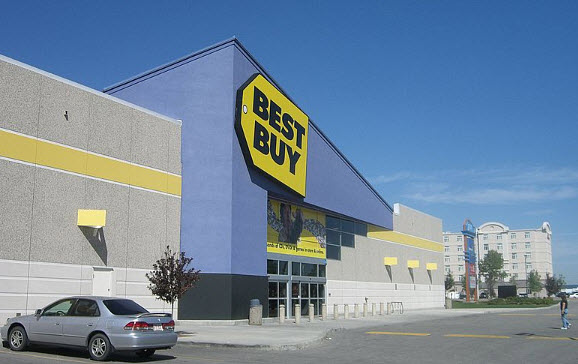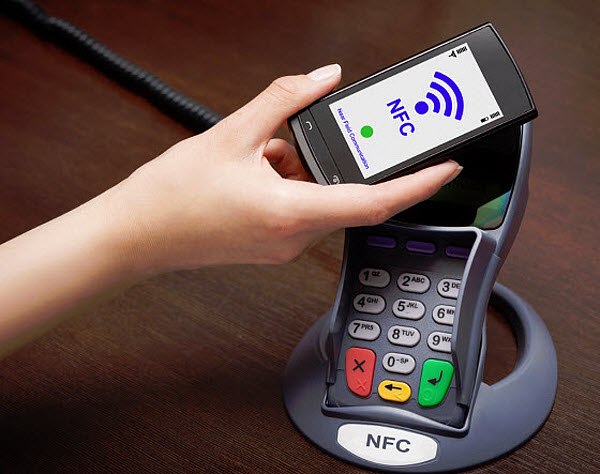Apple Pay will be accepted at Best Buy stores later this year
Apple’s mobile payments service, Apple Pay, has won another retail ally. Best Buy has announced that it will be accepting payments made through Apple Pay later this year. This may be a major shift for the retailer, as it is part of the Merchant Customer Exchange, a consortium of retailers that have an interested in mobile commerce. The Merchant Customer Exchange has its own mobile payments service, called CurrentC, which its member companies are meant to use exclusively.
Retailer breaks ranks with the Merchant Customer Exchange and CurrentC
CurrentC first attracted attention when retailers disabled some payment terminals so that they would not accept payments being made through Apple Pay. Instead, the Merchant Customer Exchange opted to release its own platform, which retailers had believed to be a more consumer friendly mobile payments solution. The platform is designed for convenience and ease-of-use, leveraging QR codes as a way to complete transactions. CurrentC has had trouble finding a place in the evolving retailer space, however, which is forcing some companies to look for better solutions.
Best Buy will continue to support CurrentC
 Though Best Buy is showing support for Apple Pay, it will still support the Merchant Customer Exchange and CurrentC. The company is concerned with providing its customers with options when it comes to mobile payments. In the past, consumers have shown favor for having the ability to choose how they pay for products and how they do their shopping. Lacking options can create a poor retail experience for some consumers, especially if they are becoming more reliant on mobile devices.
Though Best Buy is showing support for Apple Pay, it will still support the Merchant Customer Exchange and CurrentC. The company is concerned with providing its customers with options when it comes to mobile payments. In the past, consumers have shown favor for having the ability to choose how they pay for products and how they do their shopping. Lacking options can create a poor retail experience for some consumers, especially if they are becoming more reliant on mobile devices.
Apple continues to seek out retail partners for its mobile payments service
Apple Pay has emerged as a prominent mobile payments service, but it has not yet found mainstream success. Many consumers prefer to use a variety of services, while others simply purchase products from e-commerce sites directly and not through applications. Apple Pay has been working to acquire more retail partners in order to gain traction with consumers, but has only managed to find moderate success.
German companies are working together to promote mobile commerce throughout the market
NFC-based mobile payments are receiving more attention in Germany. The country’s retailers and mobile carriers are beginning to promote NFC technology as a way to participate in mobile commerce. A growing number of consumers have been demanding new mobile services that allow them to purchase products with their mobile devices. Many of these services are based on NFC technology, but relatively few German companies have embraced this technology in order to engage mobile consumers.
2,000 NFC-enabled payment terminals to be deployed in Germany
Vodafone Germany, Deutsche Telekom, and Telefonica are working with six major retailers throughout Germany to introduce new mobile point-of-sale terminals. Some 2,000 of these terminals are being provided to retailers in Germany. These terminals are equipped with NFC technology that will allow them to accept transactions being made from mobile devices. In order for these transactions to be conducted, however, the devices themselves will also have to make use of NFC technology.
NFC technology continues to play a major role in the mobile payments space
 NFC-enabled mobile devices had been rare in the past, but these devices are now quite common throughout several prominent markets. NFC technology currently makes up the majority of the mobile payments infrastructure, and devices that are equipped with the technology have little trouble participating in the mobile commerce space. Retailers have been somewhat slow to embrace the technology, however, due to the costs associated with purchasing and upgrading existing point-of-sale terminals. With the help of other large companies, retailers may be able to mitigate these costs and establish a foothold in the mobile payments scene.
NFC-enabled mobile devices had been rare in the past, but these devices are now quite common throughout several prominent markets. NFC technology currently makes up the majority of the mobile payments infrastructure, and devices that are equipped with the technology have little trouble participating in the mobile commerce space. Retailers have been somewhat slow to embrace the technology, however, due to the costs associated with purchasing and upgrading existing point-of-sale terminals. With the help of other large companies, retailers may be able to mitigate these costs and establish a foothold in the mobile payments scene.
Germany’s mobile commerce market is beginning to become more lively
Germany’s mobile commerce scene is somewhat less active than what can be found in other markets. While consumers have shown significant interest in mobile payments, they have not shown aggressive support for services that allow them to pay for products with their smartphones and tablets. This may change in the coming years, as retailers become more accommodating of mobile shopping.
 Though Best Buy is showing support for Apple Pay, it will still support the Merchant Customer Exchange and CurrentC. The company is concerned with providing its customers with options when it comes to mobile payments. In the past, consumers have shown favor for having the ability to choose how they pay for products and how they do their shopping. Lacking options can create a poor retail experience for some consumers, especially if they are becoming more reliant on mobile devices.
Though Best Buy is showing support for Apple Pay, it will still support the Merchant Customer Exchange and CurrentC. The company is concerned with providing its customers with options when it comes to mobile payments. In the past, consumers have shown favor for having the ability to choose how they pay for products and how they do their shopping. Lacking options can create a poor retail experience for some consumers, especially if they are becoming more reliant on mobile devices.
 NFC-enabled mobile devices had been rare in the past, but these devices are now quite common throughout several prominent markets. NFC technology currently makes up the majority of the mobile payments infrastructure, and devices that are equipped with the technology have little trouble participating in the mobile commerce space. Retailers have been somewhat slow to embrace the technology, however, due to the costs associated with purchasing and upgrading existing point-of-sale terminals. With the help of other large companies, retailers may be able to mitigate these costs and establish a foothold in the
NFC-enabled mobile devices had been rare in the past, but these devices are now quite common throughout several prominent markets. NFC technology currently makes up the majority of the mobile payments infrastructure, and devices that are equipped with the technology have little trouble participating in the mobile commerce space. Retailers have been somewhat slow to embrace the technology, however, due to the costs associated with purchasing and upgrading existing point-of-sale terminals. With the help of other large companies, retailers may be able to mitigate these costs and establish a foothold in the 